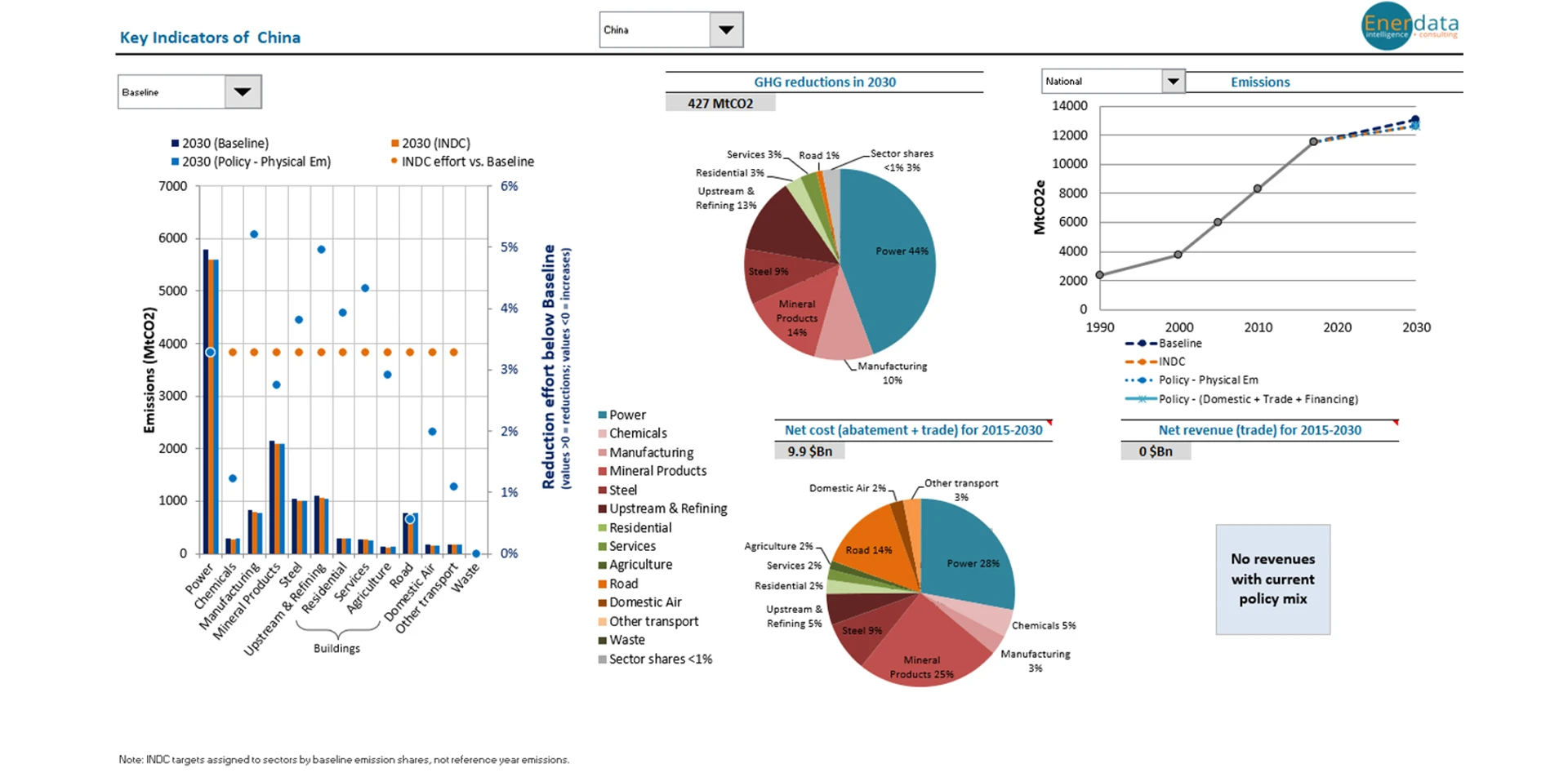The project
Enerdata was selected by the World Bank and the Brazilian Ministry of the Environment to assess Nationally Determined Contributions (NDCs) in G20 countries and in the Latin America and Caribbean regions.
The study analysed all types of pledges towards climate change mitigation, with their economic impacts in each sector. In addition, the study estimated the gap between current policy implementations and the levels needed to contain the global temperature rise below 2°C, as set by the Paris Agreement.

![]()
![]()
Strategic stakes
The Brazilian Ministry of the Environment is responsible for national policies addressing a wide range of energy and climate challenges, including carbon mitigation, energy efficiency, and the sustainable use of ecosystems. Beyond national borders, the ministry cooperates with other countries, regions, and international organisations to promote environmental strategies and instruments at a global level.
The World Bank is committed to increasing economic prosperity and sustainable development in developing countries and partnered with the Brazilian Ministry of the Environment to support the preparation of a Conference of the Parties (COP).
In this context, the two partners needed a tool capable of evaluating the level of energy and climate commitments required from many countries, of quantifying the policy instruments necessary to enact these pledges, and of measuring their economic consequences by country and by sector.
- Enerdata’s expertise in energy and climate modelling tools and their adaptation to specific needs through custom solutions enabled our team to create the EVALUATE tool. Further developed during a project with the Danish Energy Agency, EVALUATE measures the costs and emissions reductions associated with climate policies at global, national, and sectoral levels, to facilitate policy design and international negotiations.
- Enerdata’s global coverage of all energies, together with our key intelligence on energy policies and regulations worldwide, allowed for the analysis of many countries, all types of energy and climate pledges, and various policy instruments.
- Enerdata’s experience in database management supported the creation of user-friendly databases gathering analysis results.
- Development of the EVALUATE model
- Estimation of the national costs associated with NDCs, at country and sectoral levels
- Quantification of the impact of various policy instruments, including carbon emissions trading schemes, carbon taxation and regulation, and international finance
- Detailed indicators including carbon intensity of GDP, emissions per capita or GDP unit, level of required investment, impact of emissions trading on costs, and many others
- Comparison between baseline and pledge-based indicators
- Gap analysis of emission reductions and the global 2°C target
- Coverage of more than 60 countries and regions, with appropriate adjustments for each
- Analysis and database for Latin American and Caribbean (LAC) countries
- Assessment of the energy and climate pledges made by LAC countries
- Exploration and quantification of potential policy instruments’ ability to achieve their respective NDCs
- Creation of databases gathering the results of the EVALUATE tool application for LAC countries
- Training on the use of EVALUATE
- Training of governmental and ministerial authorities on the use of EVALUATE, by Enerdata experts
- On-site workshops in Brazil, complemented by a user manual
- EVALUATE model
- Original creation of our EVALUATE model, based on POLES-Enerdata and our Marginal Abatement Cost Curves (MACCs).
- MACCs have been prepared based on the EnerFuture scenarios according to different carbon prices. The levels of emission abatements, for each country, sector, target year and carbon price are fed into the EVALUATE model as an input.
- Delivery of a user-friendly interface, facilitating visual assessment and comparison, as well as future updates by the Brazilian government.
- The EVALUATE tool has been widely customised to best fit the needs and views of both the Brazilian government and the World bank. It includes a logical tab structure, dedicated automation macros, and numerous ready-to-read tables and user-friendly graphs for a rapid understanding of key results. The interface also allows the user to run their own scenarios and change numerous assumptions and scenario design features (e.g., emission reduction objectives, trade designs and limitations, policy mixes, etc.).
- The EVALUATE tool has been widely customised to best fit the needs and views of both the Brazilian government and the World bank. It includes a logical tab structure, dedicated automation macros, and numerous ready-to-read tables and user-friendly graphs for a rapid understanding of key results. The interface also allows the user to run their own scenarios and change numerous assumptions and scenario design features (e.g., emission reduction objectives, trade designs and limitations, policy mixes, etc.).
- Original creation of our EVALUATE model, based on POLES-Enerdata and our Marginal Abatement Cost Curves (MACCs).
- Databases
- Organised results of the EVALUATE tool application for LAC countries.
- The EVALUATE model contains two types of databases: input databases, which include country- and sector-specific MAC curves, and databases that contain a wide range of results at either international, national or sector level.
- Organised results of the EVALUATE tool application for LAC countries.
- Analysis
- Analysis of EVALUATE results both at Brazilian and LAC countries levels, particularly the costs and emissions reductions associated with their respective NDCs under various policy scenarios.
- Training
- On-site workshops in Brazil
- User manual

 Energy and Climate Databases
Energy and Climate Databases Market Analysis
Market Analysis